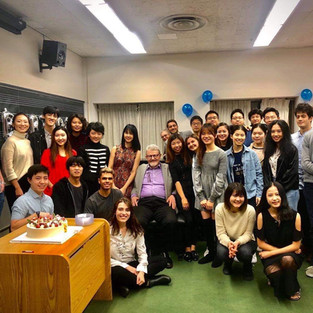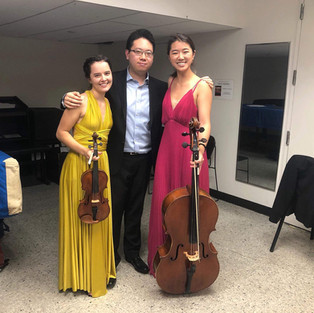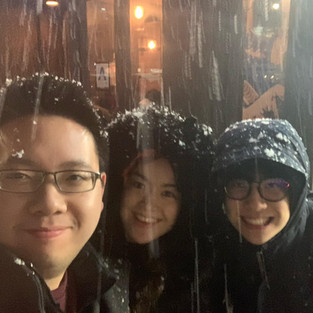Life as a masters student at Juilliard School
- alexyaugreat
- Aug 15, 2020
- 6 min read
Updated: Aug 26, 2021
As May 2020 approached, my Masters degree finished in an instant, as though somebody bewitched the time to go double speed. Due to Covid-19 the semester continues in online learning, means that life at Juilliard has been cut short and ended on the 20th of March, just after spring break. I cannot help feeling more miserable than ever having to suddenly forced to go back home to Sydney and not knowing when will I ever see my friends again. Some I had only became close with in a matter of months or even weeks prior or to! Nevertheless I would to share with you here, what it is really like studying at Juilliard.
As a master student, there is undoubtedly substantial workload. In terms of performance, they include weekly lessons, studio classes, performance classes, extra participation in masterclass by visiting world-renowned professors such as Robert Levin and Stephen Hough. (In this case for pianists) In terms of academic classes, there are compulsory classes masters students must take, at least 4 credits of history and theory subjects for the degree, and chamber music of course. My teacher was Dr. Matti Raekallio. He was extremely good natured, humourous and extremely intelligent. He was a big guy yet possessed a delicate ear that could discern footsteps of an ant, particularly when playing for him in the lesson. He was also unusually hardworking, teaching six days a week from 8am - 8pm with only one lunch break, had 35 students. He knew pretty much all the piano repertoire back to front and was always encouraging and optimistic no matter how well the student was progressing. He was never dismissive on students‘ less well-thought opinions but usually replaced it with phrases like 'ah that's a very good idea, have you tried even...' or 'This will become very good'.
There are other opportunities for performance outside of our own studio. Dr. Sachs is founder and organiser of the FOCUS festival, held yearly at Juilliard school to showcase modern music written by composers all over the world. This year's topic was Pioneering Women Composers of Post War period. Thanks to him, as he was impressed by playing of Schoenberg's 6 Little pieces Op. 19, he asked me to learn and give the US premiere of Grete von Zieritz's Sonata at the FOCUS festival 2020, which you can listen to on my soundcloud page. Another program for pianists was called 'Piano Scope', founded by Dr. Aaron Wunsch, who was one of the youngest and busiest teachers. He taught keyboard skills and sightreading, evening division classes, several history courses and of course 'Piano Scope'. Piano Scope focuses on an particular topic for each semester and explores the music of this style, its history, its trends, its aesthetic and its traditions of interpretation. There will be performance and masterclass opportunities at the end of the course where students are able to perform. I took the course in my 1st semester and learnt about 'Angels and Demons', we began discussing works of spiritual qualities that included composers like Bach, Liszt, Scriabin, Debussy and Messiaen.
Top left - right: Dr. Matti Raekallio and his students celebrating his birthday; me and my chamber group after performance of Dvorak's Trio no. 3 Op. 65; me and my friends out in the street under the snow
Bottom left-right: me making recordings in one of the Juilliard Dance studios; me during my performance at FOCUS Festival 2020
History subjects at a masters level include very succinct topics related to one composer's body of work or an era. Over the 2 years I took the following history subjects (more than required): Richard Strauss's Operas, Wagner's Ring Cycle, Mahler's Symphonies, Chamber Music from Home to Concert and Schumann at Work and finally Music after World War II. The first 3 subjects were taught by Dr. John Muller, who lectured passionately with an ultra in-depth grasp of the material combined with humour. Theory subjects on the other hand required lots of critical anlysis of the music and essay writing. I took the following: Lieder from Brahms to Berg, String Music from Bach to Bartok. These subjects were very taught with close associated to harmonic analysis and structural analysis, nevertheless an essential skill to develop as a performing musician.
Other subjects I took that were neither history not theory, were practical subjects. They exteended the students’ external musical skills which are less likely to be developed from playing our own instrument. I took: Musician as an Entrepreneur, Improvisation, Performance Workshop of Music in 20th and 21st century, and Conducting. All of which were fascinating and totally engaging. Musician as an entrepreneur was a class that devoted to learning about the music business and cultivating ideas to how a musician may begin their career in unique and personal ways rather than the normal 'winning a competition' matter. Improvisation was taught by pianist Noam Sivan, a highly skilled pianist, composer and improviser. He taught systemically how to build short and long works based on motives or themes or a mode or a bass, and spent most of the lesson improvising with each player (only 4, me on piano, a violinist, a violist and a clarinetist), encouraging us to be creative, take risks and most importantly listen hard and react. Performance Workshop of Music in 20th and 21st century was one of the very popular classes which many students took because there was no written homework and no final assignment. This class was taught by pianist and lecturer Dr. Joel Sachs, who also taught the class Music after World War II. He did not teach in a conventional based on fact matter about the music of the modern era but rather on the telling stories of his own, about his meetings and talks with Henry Cowell, Sofia Gubaildulina etc. Everyone was required to perform several times a semester a work assigned by Dr. Sachs in front the class. These modern works required performers to think deeply and try to understand modern composers' instructions and ideals on their compositions, rather than play the correct notes. It was a class for us to get out of our comfort-zone. Lastly there was conducting, taught by maestro Jeffery Milarsky. He was able to be extremely supportive towards our ideas on the music and even our conducting movements, and sought to help us develop our own individuality in conducting. In other words he did not ever tell us that 'this is a bad way to conduct, you should do this instead' but often highlighted what our weakness was and what we could do to improve and fine tune it. He was able to be very encouraging but at the same time demanded a great deal from us by constantlay putting us on the spot.
Despite all the classes I found it necessary to take long walks around central park every weekend, to immerse myself in nature again, which I sorely missed being in NYC.
Life at Juilliard, I admit, is competitive and intensive. However all the students there are always working hard to improve and only striving to be the best of themselves. It is only fitting to be in that environment to also stretch one's musical abilities, knowledges and music contacts. I worked as an accompanist at Juilliard, for extra income as an international student, which I found was totally fulfilling. I got to accompany a violinist and a singer of their lessons weekly and learnt everything I could from their teachers; first one learning about strings techniques and interpretation and the other vocal techniques. There are almost 100 practice rooms in the Juilliard, they are first come first served, not required to be booked days in advance. The building closes at 12am and at 12.01, there are always a rush of 30 or so students finishing off their practice leaving the building - not a minute is wasted.
One of the great things about studying at Juilliard, is the direct location to the Metropolitan Opera, David Geffen Hall (1 minute away) and Carnegie Hall (10 minutes away) I love opera so I go to the Met 4-5 times a semester, sometimes with friends, most of time alone, just to indulge myself in the music and experience without distractions. It was a rather depressing time when told to leave NYC because of the pandemic, knowing there are so much great things to leave behind and not knowing whether it will the same again. Nevertheless it was a rather reminiscent moment just to think all the great things that have been in NYC in my masters degree. I should not be sorry to leave behind, but glad and lucky that I got to experience it.




















Comments